- Home
- Robert Goddard
Blood Count Page 4
Blood Count Read online
Page 4
The house in Wimbledon would have been perfect for a family of four or five. As it was, for the past thirteen years it had been a home for two. And now, since Alice’s departure to Newcastle University, just one. Walking through the front door into the cold, dark hall that night, he wished he had moved on, started afresh somewhere else. But he knew the sentiment was only camouflage for a more intense regret. If the day had taught him anything, it was that no one is ever free of their past.
*
To his surprise, he slept well, waking with a mind cleansed by forgetfulness. Then, with awful swiftness, the events of the previous eighteen hours reassembled themselves in his mind. Alice had texted again to sympathize over his suspended holiday. ‘Poor u.’
He went to the club and had a swim, shopped in a daze and returned home. It was tempting to try to take his mind off the invidiousness of his situation by contacting a friend and suggesting a drink or dinner. But that would require him to explain why he was not in Austria – or preparing for a fictitious transplant. The weekend had to be a solitary one whether he liked it or not.
But solitude can be a merciless companion. Driven back more and more to memories of his trip to Belgrade in 1996, he could not help wondering just how evil a man his former patient was. He knew the answer could easily be found. A few computer mouse-clicks later, he was surveying results 1–10 of about 385,000 for Dragan Gazi. He could have read about the man and his blood-soaked career any time he pleased in the past thirteen years. But he never had. Until now.
Dragan Gazi (Serbian: Дpaгaʜ Гaэи; born 30 March 1943 in Kruševać, Serbia, Yugoslavia) is a former Serbian paramilitary leader, currently held in the UN Detention Unit at Scheveningen, The Hague, the Netherlands, during his trial for war crimes committed in Bosnia between 1992 and 1995 and Kosovo in 1998/99.
Gazi's father, Vlajko, was a member of the Chetniks, who had fought for the exiled King of Yugoslavia against German and Italian occupation during World War II. Vlajko was imprisoned by Tito's Communist regime for most of his son's childhood. In 1963, aged 20, Gazi left Yugoslavia illegally and disappeared into the European criminal underworld, emerging in South America in the early 1970s as a mercenary attached to various right-wing governments. It is widely alleged that he operated a hit squad for the Pinochet regime in Chile and later for the military junta in Argentina. While in Argentina, he married Isabel Nieto, an actress, by whom he had a daughter, Ingrid (born 1978), and a son, Nikola (born 1980, killed in a motorcycle accident, 1993).
Gazi returned to Yugoslavia in 1982, leaving his wife and children in Argentina. He established himself as a businessman in the cement industry, but it is commonly alleged that this was a front for a range of criminal activities and that he was employed by the State Security Service to carry out assassinations both in and outside the country, for which purpose he supposedly recruited a band of trained hit men.
When the Yugoslav Federation began to fall apart in 1991, Gazi founded a paramilitary group called the Serb Patriot Militia, later nicknamed the Wolves, who operated as an unofficial wing of the Serbian Army in the Vukovar region of Croatia and from 1992 in Bosnia, where they acquired a reputation for ruthlessness and brutality, particularly in the ethnic-cleansing campaigns against Bosnian Muslims.
The Wolves ceased operations but never completely disbanded after the Dayton Peace Accord of November 1995. Gazi was widely reported to be ill by this time and it is believed he underwent a liver transplant early in 1996. He is alleged to have used his paramilitaries to extend his criminal network in the post-Dayton period, but they returned to their former role in 1998 when, allegedly at President Milošević's personal request, they played a part in Serbia's attempt to crush the Kosovo Liberation Army.
A few days after NATO began bombing Serbia to force its withdrawal from Kosovo, in March 1999, it was revealed that the International Criminal Tribunal for the former Yugoslavia (ICTY) had issued an indictment against Gazi for genocide, murder, rape, crimes against humanity and grave breaches of the Geneva Convention, charging him with responsibility for all such acts carried out by forces under his command in Croatia, Bosnia and Kosovo.
As the Belgrade regime began to totter in the wake of the NATO bombings and Milošević's own indictment by ICTY, rumours spread that those whose testimonies might damage Milošević were targets for elimination. The assassination in January 2000 of Željko Ražnatović (aka Arkan), another prominent paramilitary leader who had also been indicted, seemed to confirm this. Gazi dropped out of sight. His whereabouts remained unknown for the next eight years.
He was arrested in Budva, a resort town on the Montenegrin coast, on 22 April 2008, where he had apparently been living for several years, posing as a Spanish businessman who had retired to the Adriatic to paint. He was extradited to the Netherlands and is currently in ICTY custody in The Hague. His trial opened on 8 December 2008, but has been subject to numerous adjournments and he has not yet testified.
The arrest in Belgrade in July 2008 of the even more notorious ICTY fugitive, Radovan Karadžić, sparked rumours that Gazi might have revealed where Karadžić was hiding as part of a deal with prosecutors, but his consistent refusal to cooperate with the tribunal (he has said he does not recognize it as a valid court and has declined to enter a plea) suggests otherwise.
Wikipedia’s summary of the shadowy life and criminal career of Dragan Gazi should have prepared Hammond for the gruesome details of his Wolf paramilitaries’ actions to be found on other sites. But those details held the force of specificity: the dates, times and locations of the torturings and ethnic rapes and mass executions; the lorryloads of bodies; the pits dug in fields; the records of the dead and the recollections of the living.
The text of Gazi’s ICTY indictment ran to many pages. The list of atrocities was horribly repetitious: the same things done in different places to people whose lives were either ended or marked for ever. If Gazi personally shot or raped anyone, it was not stated. Everything was on his orders and under his command. There he was, in a photograph taken somewhere in Bosnia in 1992, dressed in battle fatigues, holding an automatic pistol in one hand and a fluffy toy wolf cub in the other, with a gathering of his human wolves around him: unsmiling, unabashed, uncompromising; the warlord in his element.
But war was not Gazi’s only concern. Other sites referred to his reputation as an underworld figure: assassinations, smuggling rackets, diversions of government funds. There was apparently nothing in the stew of corruption that was Serbia under Milošević he had not played some part in. And this was the source of the money Hammond was now trying to secure for his family. The thought of it was sickening.
When the telephone rang, Hammond was grateful for the interruption. But his gratitude lasted only as long as it took him to recognize the caller’s voice.
At first he believed he must be mistaken, having only the one word ‘Edward?’ to work on. ‘Who’s calling?’ he asked, hoping desperately to be proved wrong.
‘Alan Kendall.’ So. He was not wrong. ‘Planning to contact me, were you?’
‘Why would I be?’ They had not spoken since Kate’s funeral. The idea that they had anything to say to each other now, thirteen years later, should have been preposterous. But Hammond’s encounter with Ingrid Hurtado-Gazi had turned his world upside down. And here, back in it, was the man Kate had wanted to marry in his place – and would have, had she lived.
‘I wondered how easy it’d be to track you down,’ said Kendall. ‘I thought you might have moved somewhere smaller.’
‘What is this about, Alan?’
‘Don’t you know?’
‘No.’
‘That’s funny.’
‘Why?’
‘Tell you what. I’m in your area. Let’s meet. The Hand in Hand in, say, half an hour?’
‘Why don’t you just explain right away?’
‘I’d rather talk face to face. I could come to the house if you prefer.’
No. Hammond definitely did not pre
fer. He sighed. ‘All right. The Hand in Hand. I’ll see you there.’
The house would probably have been Kendall’s home if Kate had lived long enough to marry him, or even to change her will. As it was, Hammond had inherited her share and Kendall’s hopes for a life with her had come to nothing.
Kate had met him at the estate agency they both worked for. He was younger than Hammond, younger than Kate too, come to that. What attracted him to her was obvious, what attracted her to him a mystery, at least to Hammond, until Kate eventually explained it to him. ‘He listens. He cares. He notices.’ Ah. So that was it.
The Hand in Hand, on the edge of Wimbledon Common, was only a ten-minute walk from the house. It held its own bitter place in Hammond’s memories of his break-up with Kate, since it was at a table outside the pub that he had first seen her with Kendall, chatting and laughing in the sunshine as Hammond drove past, on his way home unexpectedly early, one late-summer afternoon in 1995. And hand in hand is just what they had been.
It was too cold for anyone to be sitting outside on a winter’s afternoon in 2009. Inside, a selection of middle-class manhood had gathered to watch Six Nations rugby on the pub’s television, leaving a corner of the bar close to the door thinly populated. Kendall was waiting for him there, cradling a pint of lager and kitted out in standard issue weekend casuals. He had put on weight and lost some hair since their last encounter. The observation gave Hammond some small satisfaction to offset his foreboding.
‘Buy you a drink?’ Kendall offered unsmilingly.
‘OK. Thanks. I’ll have a pint of bitter.’ Ordinarily, Hammond would have opted for something soft, but he felt he needed to preserve a blokish equilibrium, at least to start with.
The pint came and they moved to a table by the window, a long and discreet way from the rugby mob. Studying Kendall’s flushed and puffy face, his youthful good looks easily forgotten, Hammond wondered whether Kate would still have been with him had she lived. Perhaps she would have moved on to someone else, or even back to the man who still loved her. ‘How have you been, Alan?’ he forced himself to ask.
‘If you read the papers, you’ll know estate agency isn’t the business to be in right now.’
‘I meant … personally.’
‘I got married … three years after Kate. And divorced after another three. There’s a kid who costs me an arm and a leg. Otherwise …’ He gulped some lager. ‘I never found anyone like Kate. You?’
‘No.’ God damn it, they would soon be remarking on how much they had in common. Hammond preferred detesting the man, he really did. ‘So, what’s this all about?’
‘You tell me.’
‘Sorry?’
‘Well? Don’t you have something to tell me?’
‘No. I don’t.’ Hammond looked straight at Kendall, communicating incomprehension and exasperation. ‘This was your idea. Remember?’
‘You’re sure there’s nothing you think I ought to know?’
‘About what?’
‘Not what. Who.’
‘OK then. Who?’ He knew the answer, of course. It was the only possible answer.
‘Kate.’
Hammond took a swallow of beer. He knew he had to draw whatever it was out of Kendall without hinting at the turmoil his life was currently in. He knew he had to appear baffled but unconcerned, even though he was actually neither. ‘You’re going to have to explain, Alan. I’ve no idea what you’re talking about.’
‘I had a phone call at the office this morning.’
‘I imagine you had several.’
‘Not about houses. This was from a woman, foreign-sounding, Spanish maybe. She wouldn’t give her name. She just wanted me to know.’
‘Know what?’
‘She said I should expect to hear from you. About Kate.’
‘She said that?’
‘Yeah. Then she put the phone down. I tried calling her back, but—’
‘Number withheld?’
‘Exactly.’
Hammond shrugged. ‘Well, I’m afraid I’ve nothing to tell you about Kate. It was obviously some kind of crank call.’
‘After thirteen years? What kind of crank would know about Kate and me and wait all this time to do something about it?’
‘I really don’t know. It’s odd, I admit.’
‘It’s a lot more than odd, Edward. Listen.’ Kendall craned across the table towards him. ‘I know I said some pretty … extreme … things about you back then. Virtually accused you of …’ He waved his hand semi-apologetically. ‘I was upset. And suspicious. But the police made it crystal clear to me there were no grounds to … think you had anything to do with Kate’s murder. OK? I understand. I accept it.’
‘Good.’
‘So, if you’re holding out on me because of that, if there really has been some kind of breakthrough in the case …’
‘There’s been no breakthrough.’ Kendall still loved her, more than a decade on, despite marriage to another woman in the interim. He still loved Kate. It was a disarming discovery. But Hammond was determined not to be wrongfooted by it. ‘Nothing’s happened. OK?’
‘You’re sure?’
‘Of course I’m sure. It’s not the kind of thing you can be vague about, is it? I don’t know who phoned you, or why, but I can assure you I don’t know anything about Kate’s murder that you don’t know.’ The lie had to be told. But, as the words came out of his mouth, Hammond wondered if he would soon come to regret them.
Kendall looked confused, as well he might. But he also looked convinced. ‘That’s weird.’
‘It certainly is.’
‘She didn’t sound like a nutter.’ He sat back and glared glumly into his lager. ‘It must mean something.’
‘Not necessarily.’
‘No.’ Kendall waggled a forefinger at him. ‘It must. And I’m going to find out what it is.’
‘How will you do that?’
‘Maybe she’ll call again. Then maybe I’ll work out who she is and what the hell she’s after. If I do, you’ll be the first to know, don’t worry.’
But worried was exactly what Hammond was.
Kendall was most of the way through a second pint when Hammond left him to it. A chill dusk was falling as he headed home, the coldness of the air doing a little to calm his thoughts.
As soon as he was out of sight of the pub, he stopped, took out his phone and rang Ingrid Hurtado-Gazi’s number. But there was no answer. And he did not leave a message.
He carried on to the house, an evening of anxiety and uncertainty stretching ahead of him. As he reached the door, his phone rang. It was Ingrid.
‘You have something for me, Dr Hammond?’
‘A warning to lay off is what I have for you. What the hell do you mean by contacting Alan Kendall?’
‘Who?’
‘You know damn well who he is.’ He opened the door and strode in, slamming it behind him.
‘You sound upset.’
‘Of course I’m bloody upset. We had a deal.’
‘We still do. Arrange the release of the money and all your problems will go away.’
‘I stand a better chance of doing that without you setting Kendall on me.’
‘Have you spoken to the Accountant?’
‘Yes. And I will again soon. I’m confident he’ll cooperate.’ Confident? He was a long way from that. But it had to be said. ‘I just need a little time.’
‘You have it.’
‘What I don’t need is you pulling stunts like this.’
‘Get us the money, doctor. Then there will be no more stunts. I promise.’
‘That’s not—’ But he was talking to himself. Ingrid had rung off.
SIX
Edward Hammond was ten in 1967, the year of the first ever heart transplant. He remembered his father’s excitement at the news. ‘This, my boy, will change the medical world.’ And so it did.
Hammond did not know then that he would become a surgeon when he grew up. In what was to be
his specialism, the liver, the first transplants had actually been carried out two years previously. They were still very rare when he became a medical student in the late 1970s, but had become much commoner and more successful since, until they were quite literally an everyday event.
The first he presided over remained unique, of course. A framed photograph of the patient hung on his consulting-room wall at St George’s. She was sitting up in bed, smiling with the characteristic radiance of someone who had been given a new lease of life – a whole new life, indeed. She was still alive and well fifteen years later. She sent him a card every Christmas.
The saving of life, as she would have been the first to agree, is a wonderful thing. And the wonder of it is not conditional on the virtue of the beneficiary. At least, it is not supposed to be. Hammond felt affronted that one operation among all the others he had conducted in his career should now have become an albatross round his neck. No one would condemn the lawyers who were defending Gazi in The Hague. They would sit there in their robes day after day, clocking up their fees and expenses as the process ground on, and no one would utter a word of complaint. Why should he be singled out? Why should he be made to feel guilty for pursuing his professional calling?
He knew the answer, of course, which made it only harder to bear. He had been set up. He had played a double role without knowing it. In saving Gazi’s life, he had pawned his own.
Such were the thoughts that swirled in Hammond’s mind as he hurried across Hyde Park on a bleak, grey Sunday afternoon. His hopes of a swift resolution to his problems were pinned on his meeting with Marco Piravani and he was disappointed not to see the Italian waiting for him as he turned on to the Serpentine bridge. Hammond was punctual to a fault, but he guessed he should have expected Piravani not to be.
To his surprise, however, he recognized someone else on the bridge. The young man in a hoodie leaning against the railings and sucking on a roll-up was surely the same young man he had seen in the kitchen of the house in Ealing. The coincidence immediately aroused his suspicion. What was he doing here?

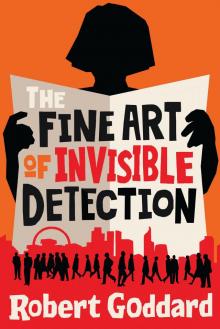 The Fine Art of Invisible Detection
The Fine Art of Invisible Detection One False Move
One False Move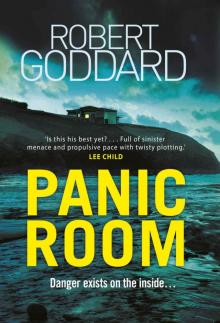 Panic Room
Panic Room Beyond Recall
Beyond Recall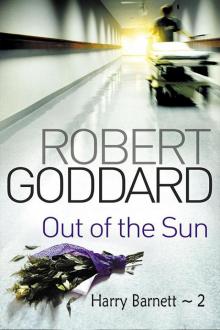 Out of the Sun
Out of the Sun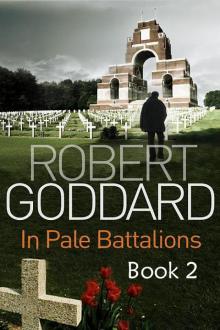 In Pale Battalions - Retail
In Pale Battalions - Retail Painting The Darkness - Retail
Painting The Darkness - Retail The Corners of the Globe
The Corners of the Globe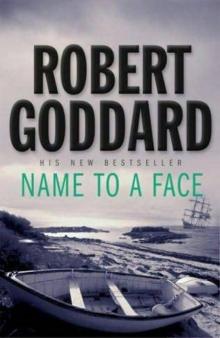 Name To a Face
Name To a Face Closed Circle
Closed Circle Caught In the Light
Caught In the Light Into the Blue
Into the Blue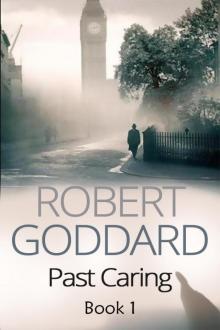 Past Caring - Retail
Past Caring - Retail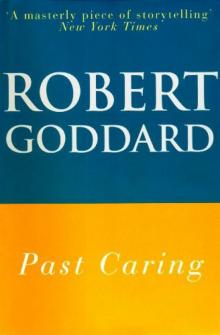 Past Caring
Past Caring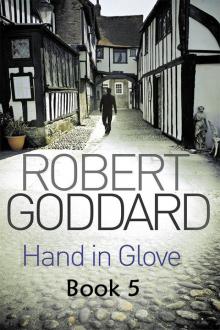 Hand In Glove - Retail
Hand In Glove - Retail Borrowed Time
Borrowed Time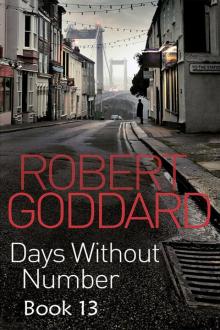 Days Without Number
Days Without Number James Maxted 03 The Ends of the Earth
James Maxted 03 The Ends of the Earth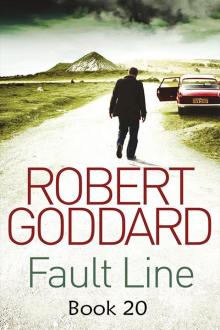 Fault Line - Retail
Fault Line - Retail Play to the End
Play to the End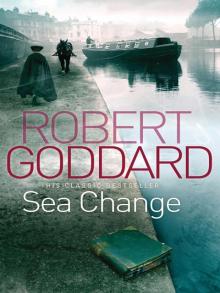 Sea Change
Sea Change Never Go Back
Never Go Back Take No Farewell - Retail
Take No Farewell - Retail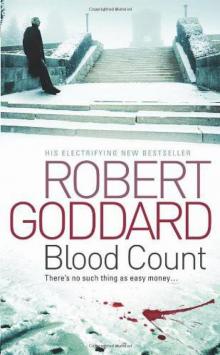 Blood Count
Blood Count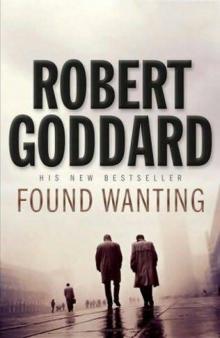 Found Wanting
Found Wanting Sight Unseen
Sight Unseen Hand in Glove
Hand in Glove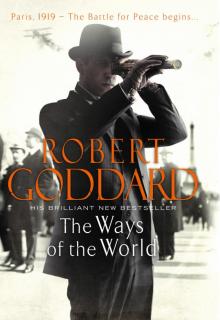 The Ways of the World
The Ways of the World